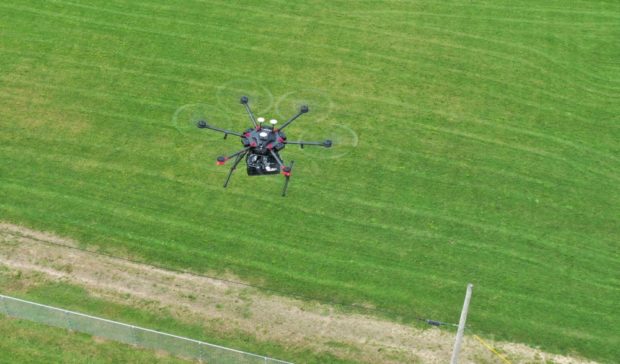and Ericsson have announced that they have begun 5G testing at altitude using drone technology. These tests are the first of their kind with UScellular’s 5G network and lay the groundwork for future use cases of cellular-connected drones in a variety of industries.
Initial visual line of sight trials were conducted in Beloit, Wis., using a drone that was flown between two of UScellular’s commercial 5G towers. The drone was outfitted with a 5G smartphone and RF measurement equipment designed to capture performance metrics such as signal strength and quality, upload and download speeds, and latency throughout the flights at various altitudes. Data was gathered using both low and high band spectrum, and the goal of the initial trial was to gather and analyze network connectivity and speed data in the air, compare it to the speeds experienced on the ground and ultimately understand what is required for the future use and success of 5G connected drones.
“Testing our wireless connections at altitude can set the stage for future connectivity of drones in the air, providing command and control capability along with enabling real-time image and data sharing to be easier, faster and safer,” said Narothum Saxena, vice president of technology strategy and architecture at UScellular. “We believe that our network can help drones fly in an optimal way if they have connectivity, and with Ericsson’s support, we will continue to drive innovation that can help enhance our customers’ wireless experience.”
One drone use case for UScellular and other wireless providers is the ability to inspect towers without climbing them. This type of use can also extend to other industries – a farmer can inspect the top of a barn or a silo or a city worker can inspect their water towers. Tasks like this can be done now with non-connected drones, but with 5G connectivity, a drone will be able to reach areas beyond visual line of sight of a pilot and will allow footage to be livestreamed over UScellular’s network. This means site inspections become much more efficient and cost-effective, with benefits such as real-time data collection and delivery and ensuring the right footage is captured, especially in hard-to-reach areas.
“Drone technology offers a wide scope of new opportunities in today’s market. Our testing with UScellular is a huge step for advanced connected drones use cases that will benefit society and businesses,” said Jossie Prochilo, Vice President and Key Account Manager, UScellular Account for Ericsson North America. “Ericsson Connected Drone Testing and Ericsson Device Analytics enables service providers to move forward with proven solutions and provides UScellular with an industry-leading set of capabilities for connected drone testing to support the commercial operation of drones over 5G networks.”
According to a recent Arthur D Little study, the number of unmanned aerial vehicles – specifically drones – sold worldwide is increasing steadily with overall market size increasing up to US $30 billion in the next 10 years with value of services reaching $50 billion in the next five. Commercial drones that can fly over long distances and beyond visual line of sight present a huge opportunity for multiple industries and consumers. Essential medicine can be delivered quickly, and important supplies can be provided to severe weather impacted areas, with the key feature in all these use cases being 5G connectivity.
Source: Press Release

